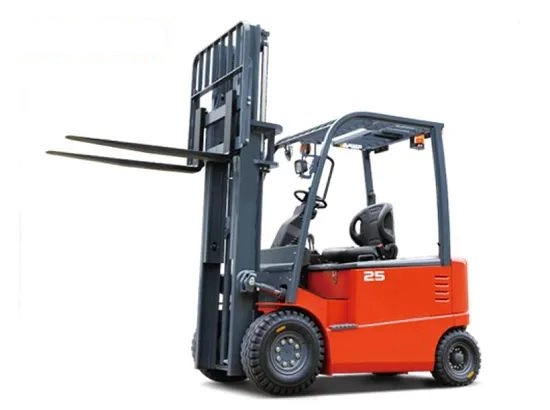Comparison Between Electric Forklifts and LPG Forklifts
The following is a comparison between electric forklifts and Liquefied Petroleum Gas (LPG) forklifts:

1. Performance Characteristics
- Power Output: Electric forklifts deliver relatively stable power output, making them suitable for operations requiring high precision. In contrast, LPG forklifts boast strong power, with higher output power and torque, and perform exceptionally well in scenarios involving heavy load handling or high-speed operations.
- Travel and Lifting Speed: Generally, LPG forklifts have faster travel speeds and load lifting speeds than electric forklifts, which helps improve work efficiency—this advantage is particularly evident when operating in large-scale warehouses or outdoor sites. However, with the advancement of electric forklift technology, the speed of some high-end electric forklifts has also been significantly enhanced.
- Endurance Capacity: Electric forklifts have limited endurance; a single charge typically supports around 8 hours of use. For prolonged continuous operation, spare batteries or fast-charging technology are required. LPG forklifts, on the other hand, can operate continuously as long as there is fuel in the tank. With short refueling times and stronger endurance, they are more suitable for multi-shift work scenarios.
2. Operating Costs
- Acquisition Cost: Electric forklifts have higher upfront acquisition costs, primarily due to the high prices of their batteries and charging equipment. An electric forklift with the same load capacity and specifications is approximately 30% to 50% more expensive than an LPG forklift. LPG forklifts, by contrast, have relatively lower acquisition costs and require less initial investment.
- Fuel/Electricity Cost: Electric forklifts are powered by electricity, resulting in low energy consumption costs. The average hourly electricity cost is only 30% to 50% of the hourly fuel cost of LPG forklifts. LPG forklifts use liquefied petroleum gas as fuel, which has a relatively high price, leading to substantial long-term fuel expenses.
- Maintenance Cost: Electric forklifts have a simple structure, lacking complex mechanical components such as engines and transmissions. This translates to low maintenance costs and a lower frequency of part replacements—their maintenance cost is usually only 1/3 to 1/2 of that of LPG forklifts. LPG forklifts, however, require regular maintenance for their engines and related mechanical components, with a higher frequency of replacing parts like engine oil, spark plugs, and filters, resulting in higher maintenance costs.
3. Applicable Environments
- Indoor Environments: Electric forklifts produce no exhaust emissions and have low noise levels, so they do not pollute indoor air or affect the health of workers and the working environment. They are suitable for indoor locations with enclosed spaces or high environmental requirements, such as warehouses, supermarkets, and workshops. Although LPG forklifts emit less exhaust than diesel forklifts, they may still cause certain exhaust pollution in poorly ventilated indoor environments and thus require good ventilation conditions.
- Outdoor Environments: Electric forklifts are greatly restricted by weather and road conditions when used outdoors. Their performance may be affected when driving in rainy or snowy weather, or on rough roads. LPG forklifts, by comparison, are more suitable for outdoor environments, as they can adapt to various harsh weather conditions and complex road surfaces—such as construction sites, docks, and logistics parks.
4. Environmental Protection and Safety
- Environmental Performance: Electric forklifts generate no exhaust emissions during operation, causing no pollution to the environment and making them eco-friendly material handling equipment. LPG forklifts, when burning fuel, produce certain exhaust gases such as carbon dioxide, carbon monoxide, and nitrogen oxides, which cause some environmental pollution—though their emission levels are lower than those of diesel forklifts.
- Safety Performance: Electric forklifts are powered by batteries and have no open flames or high-temperature components, so they are less likely to cause fires or explosions and offer high safety. The liquefied petroleum gas used in LPG forklifts is a flammable and explosive gas; therefore, strict compliance with safety regulations is required during storage, transportation, and use to prevent safety accidents caused by gas leaks.


